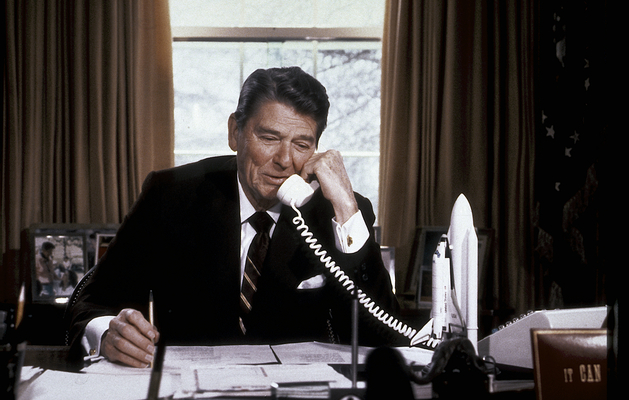The conservative giants of the second half of the 1900s — Ronald Reagan, Antonin Scalia, Dwight D. Eisenhower, Milton Friedman — supported the Article V convention process.
This should come as no surprise. The latter half of the 20th Century was marked by a robust conservative movement. A worthy response to the Progressive Era’s emphasis on big government programs and loose interpretation of the Constitution, the postwar conservatives sought to restore the Founders’ vision of limited government and combat Progressive Era spinoffs, including the “Great Society.”
Even as sitting politicians began to question whether the Constitution was “outmoded” — mainly because it obstructed their quest for an all-benevolent nanny state — conservatives touted the nation’s founding charter as a legal defense against a potentially tyrannical federal government. It only makes sense, then, that many of them embraced the Article V convention as the constitutional safeguard against an oppressive government.
Nobel Prize-winning economist and outspoken proponent of capitalism Milton Friedman, for example, endorsed the call for an Article V convention as “the one device that can effectively bypass the Washington bureaucracy.” He contended that the federal government was structurally broken, requiring structural remedies.
“In my opinion, the only feasible way of stopping tax increases is via constitutional limitation on government spending and government taxes,” he said. “We must not kid ourselves into thinking we are going to remedy it by the easy way of electing the right people into office. That will not work.”
That not even Friedman regarded it as problematic to acknowledge the existence of a “defect in our political structure” is telling.
President Dwight D. Eisenhower may have favored limited government, but he did less to oppose big government programs than many of his fellow Republicans would have liked. Nevertheless, the war hero turned politician pulled off the seemingly impossible: he balanced the federal budget. Thrice.
Much like Friedman, Eisenhower worried about the “distant bureaucracy.” The Founders may have foreseen many things, but, he pointed out, they could not possibly have predicted “that, in the space of three lifetimes, the Republic would extend from the Atlantic three thousand miles out into the Pacific, or overleaping an independent neighbor would reach into the Arctic. … They could not know that in less than two centuries the immensity of domestic and international affairs would tend to create in us a feeling of individual helplessness and even lead us into an unthinking abandonment of personal and local responsibility to a few men in government, giving to them a frightening power for good or evil; and almost certain to invite error or abuse.”
He was worried that Americans were slowly yielding their ability to govern themselves. Fortunately, he added, “the Founders provided a final and decisive means of reformation and restoration by the people themselves. Through their state legislatures and without regard to the federal government, the people can demand and participate in constitutional conventions in which they can, through their own action, adopt such amendments as will reverse any trends they see as fatal to true representative government.”
Eisenhower offered his hearty approval: “[I]f you and your generation fortified by a superb education, with access to the knowledge and wisdom of the ages, and imbued with the spirit of our founders, decide that reformation of a radical kind becomes due — then I say, let nothing stop you! Study, examine, survey, think, consider, decide, and then — by all means — act!”
But what about a “runaway convention”? Wasn’t Eisenhower fearful the American people, acting through the Constitution, might rewrite the Constitution? Sixteen years after Eisenhower’s speech, the future Supreme Court Justice Antonin Scalia explained why constitutionalists need not worry about a runaway convention.
Responding to opponents’ hyped-up fears about “bad amendments” emerging from a convention, Scalia satirically replied, “All those things are possible, I suppose, just as it is possible that the Congress tomorrow might pass a law abolishing social security as of the next day, or eliminating Christmas.”
As for Scalia, he revealed he had “no fear that such extreme proposals” would ever survive the convention process.
“The Founders inserted this alternative method of obtaining constitutional amendments,” he believed, “because they knew the Congress would be unwilling to give attention to many issues the people are concerned with, particularly those involving restrictions on the federal government’s own power. The Founders foresaw that, and they provided the convention as a remedy. If the only way to get that convention is to take this minimal risk, then it is a reasonable one.”
Friedman pushing for constitutional spending limitations, Eisenhower sounding the alarm about the loss of self-government, Scalia urging restrictions on the federal government’s power — they all paved the way for Ronald Reagan.
The Great Communicator naturally supported calls for an Article V convention. After all, “We can’t depend on Congress to discipline itself . . . .”
“Fortunately, our Nation’s Founders gave us the means to amend the Constitution through action of state legislatures,” he said. “Unless we act quickly, the people in the White House and those running Congress will bankrupt America.”
The story of the 20th Century tells of how the federal government continued to grow seemingly unchecked. However, it also tells of how constitutionally-minded individuals pushed back against federal excesses, urging the states and the people to employ Article V.
If they were concerned about the size of the federal government (when the national debt was less than one trillion dollars), we can only imagine how forcefully they would argue for an Article V convention today. Even as we continue their fight, it’s humbling to know that men like Dwight D. Eisenhower and Ronald Reagan would have supported our efforts.
If you would like to join them, sign the COS petition below to show your support for an Article V convention to limit federal spending, power, and terms of office!
Article V through the years: Postwar Conservatism
Published in Blog on April 15, 2025 by Jakob Fay






